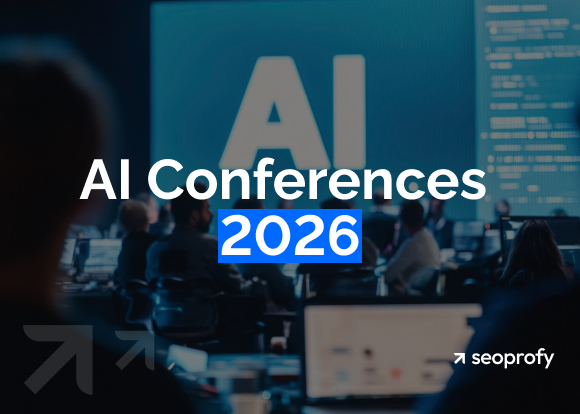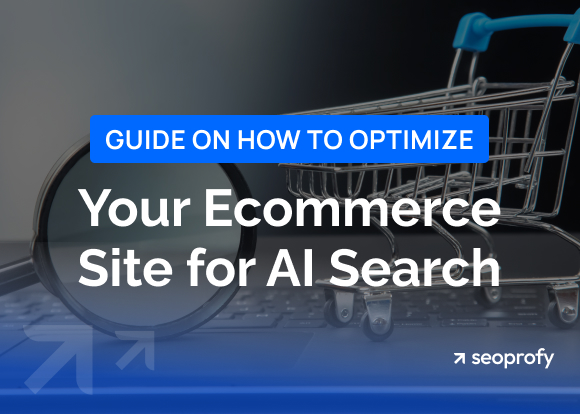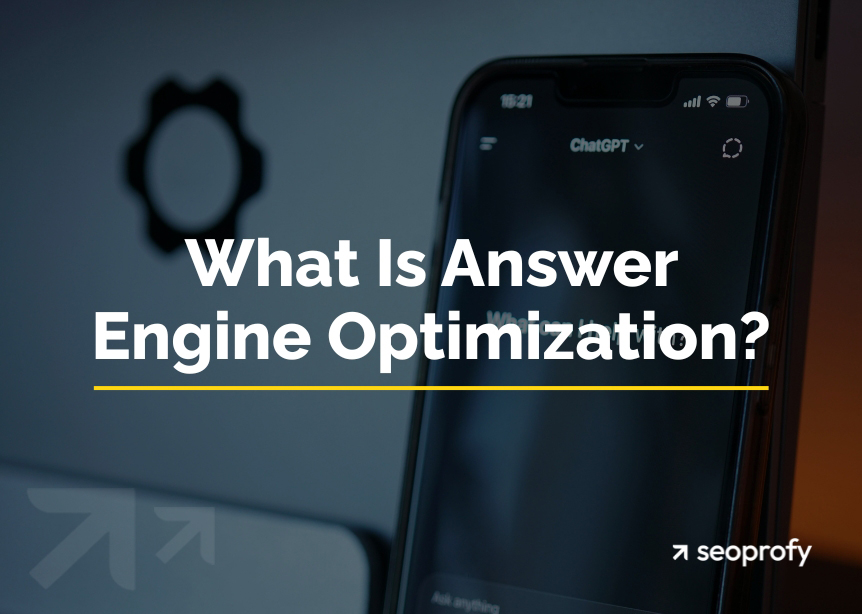If you’re using AI-generated content for SEO, or thinking about giving it a try, you’ve probably had the same question a lot of marketers and business owners are asking: Is it actually helping my rankings? Or could it be hurting them?
The answer isn’t always black and white. Sometimes AI content can save hours of work and still perform well. Other times, when it’s too generic or doesn’t align with what search engines prioritize, it might not meet the mark.
In this article, we’ll look at how Google treats AI-generated content. You’ll also see what the data says about its performance and what industry experts are saying. Finally, we’ll share the risks involved, along with best practices on how to avoid them.
- AI content can rank well in search results as long as it’s accurate, helpful, and meets Google’s quality standards.
- Google doesn’t punish websites only because they used AI. It mostly happens because the content is of low quality and is created to manipulate the search rankings.
- Over 86% of marketers edit the content generated by AI tools to add their human perspective and expertise.
- The main issues with using AI tools for content creation are that they can produce inaccurate data and often lack E-E-A-T signals.
- The biggest risks come from publishing unedited AI content at scale. This led to many websites losing their ranking and traffic after the March 2024 Core Update.
How Does AI Content Affect SEO?
The answer to this question depends on how exactly you’re using AI for content generation. Let’s look at what the data says — and what experts in the field are seeing firsthand.
Flying Cat Marketing recently surveyed marketing teams to see how content generation correlated with SEO performance. Surprisingly, their findings showed no direct link between AI content and search engine rankings.
The study split respondents into four groups, ranging from “no AI use at all” to “AI-generated blog posts with minimal human editing.” The results?
67% of all respondents, regardless of AI usage, reported an increase in organic traffic over six months. Even the group that relied most heavily on AI content generators (more than 50% of the content created by tools) reported similar results to those who used no tools at all.
That lines up with what Peter Rota shared on LinkedIn. He used AI to publish five blog posts per month, each supported by five quality backlinks. The content made up about 21% of the site’s total indexed pages and grew steadily through four core updates and three spam updates. Peter summed it up like this:
“I’m a proponent of publishing AI content at a steady pace. If you just start blasting a site with AI content that adds no new value, you’re more likely to take some hits.”
Peter Rota
He also flagged some important context. The site he worked with already had strong branded search traffic, and before implementing AI content strategies, he overhauled meta titles, internal linking, and headers.
Despite the effectiveness of AI content that some companies have seen, there are still SEO experts who aren’t convinced it’s a long-term strategy. Eli Schwartz, author of Product-Led SEO, wrote on LinkedIn:
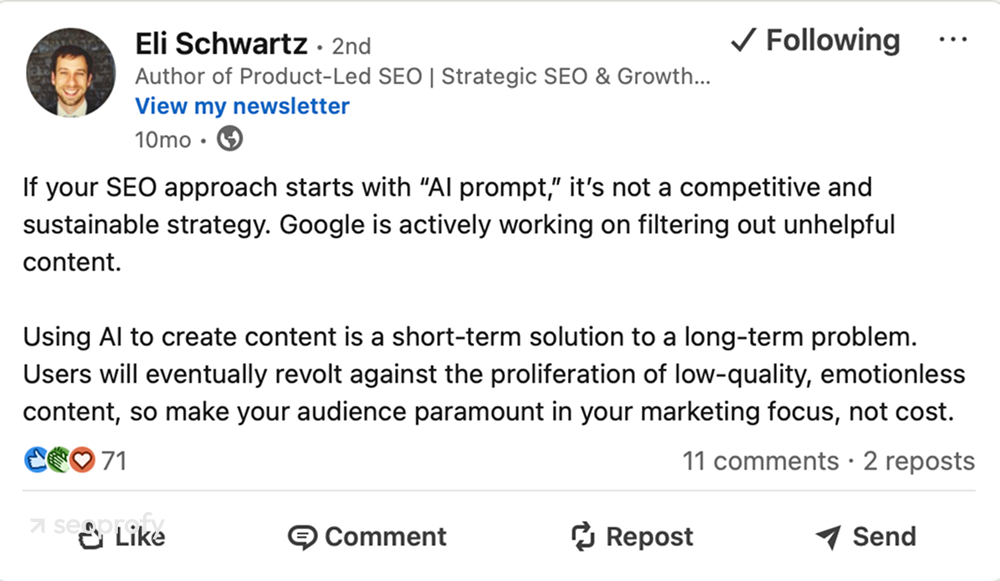
But what does Google say about how AI content impacts SEO, and can it lead to penalties? Let’s find out.
Google’s Stance on AI-Generated Content
Back in early 2023, Google published a clear stance in its Search Central blog post. The short version: Google doesn’t automatically penalize content just because it was produced with AI.
What matters is whether the information is helpful, accurate, and made with users in mind, not whether a human or a tool wrote the first draft. Here’s how Google phrased it:
“Using automation — including AI — to generate content with the primary purpose of manipulating ranking in search results is a violation of our spam policies. However, not all use of automation, including AI generation, is spam.”
Therefore, AI content can rank as long as it aligns with Google’s broader guidelines. That said, the bar has gotten higher. With the new March 2025 Core Update, Google is going to pay even more attention to the quality of content and how it serves users.
So, Can Google Detect Content Written with AI?
There’s no straightforward answer here. In comments reported by Search Engine Journal, John Mueller didn’t confirm whether Google can detect AI-generated content. But he did say this:
“If we see that something is automatically generated, then the webspam team can definitely take action on that.”
John Mueller
A study from Originality.AI also looked into this. They analyzed 50 websites that were either deindexed or penalized after recent updates.
Every one of them showed high levels of automatically generated content. Although it’s not definitive proof that detection led to penalties, the pattern is hard to ignore.
Just recently, Google made some changes to how it evaluates content quality. Human raters are now asked to check whether the main content was created using automated or generative AI tools. If that’s the case, it may receive the lowest quality rating. This was shared by John Mueller during Search Central Live in Madrid.
Moreover, Google uses SynthID. This is a tool that watermarks AI-generated content (used in Google’s AI products). The watermark is invisible to the human eye but detectable by systems.
Thus, Google has started paying more attention to content quality and is putting more measures in place to make sure users get helpful, accurate information that meets their needs. And since SynthID is only used in Google’s own tools, the detectability of content generated with other products remains inconsistent.
What’s Wrong with AI-Generated Content?
There’s no doubt AI can help speed up your content production. Many business owners are drawn to this idea in hopes of shortening the SEO timeline. It seems pretty straightforward: with a prompt and the press of a button, you can get a full article written in minutes. But there are both pros and cons of AI-generated content, and fast doesn’t always mean effective.
When it comes to SEO, brand trust, and user experience, speed alone won’t carry you. Below are the specific reasons why AI content might not always be the best choice for your business.
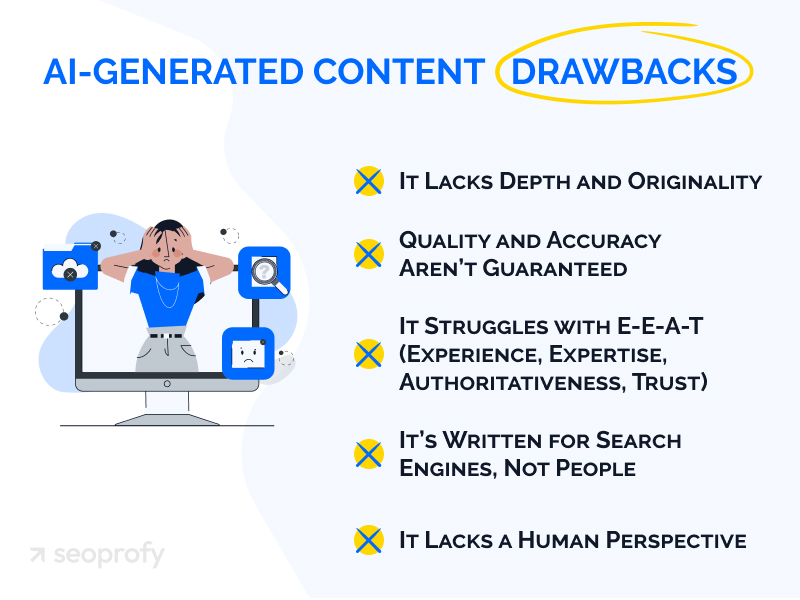
It Lacks Depth and Originality
A major weakness of AI-generated content is that it often regurgitates what’s already out there. And you end up with pages that repeat surface-level information without offering anything new.
Worse, when dozens of sites use similar AI models, they start publishing near-identical content. Google’s SpamBrain system is built to spot this kind of low-effort material.
That includes pages that are mass-produced by tools with little thought given to structure, originality, or usefulness. In the long run, such pages can lead to penalties as they are against Google’s spam policies.
Quality and Accuracy Aren’t Guaranteed
According to our statistics, 30% of professionals believe AI-generated content is not always accurate, and they’re not wrong. This is because tools like ChatGPT or Claude don’t verify their information. They generate what sounds right based on patterns in the data they were trained on.
That means they can make things up entirely. These so-called “hallucinations” aren’t rare. In a recent study that evaluated how well different large language models (LLMs) could retrieve accurate citations, they found that ChatGPT 4.0 hallucinated 28.6% of the time.
What’s more, these models have a knowledge cut-off. For example, GPT-4o, as of April 2025, doesn’t have access to real-time data and is trained only on information available up to June 2024. That means anything later than this date is outside its scope unless specifically integrated. And although some models have access to the internet, they don’t do a great job of evaluating the quality of their sources.
It Struggles with E-E-A-T (Experience, Expertise, Authoritativeness, Trust)
Google uses E-E-A-T to evaluate whether a piece of content was produced by someone with actual experience and knowledge in the subject area. This applies across the board but carries more weight in industries like finance, health, legal, B2B software, and any other category that impacts people’s decisions or well-being.
The problem with AI-generated content is that it often lacks the things this framework prioritizes: first-hand experience, credibility, and authoritativeness. As a result, it gets deprioritized in search.
So, if you leverage AI tools in your SEO content strategy, don’t stop at the first draft. Add your own experience. Bring in your brand voice, and have a subject-matter expert review it before it goes live. That way, you can build trust with both your audience and search engines.
It’s Written for Search Engines, Not People
Some AI content tools are built to optimize for keywords above all else. In its Spam Policies, Google has been clear about this. Keyword stuffing is flagged as a manipulative practice. If your content repeats target terms unnaturally or tries to cram in every variation of a keyword, it can be penalized or ignored entirely. Here’s what Danny Sullivan, a Google liaison, says about it:

To avoid a negative impact of AI-generated content on SEO, write with intent and use keywords organically. Ultimately, humans are going to read your content, so make sure it sounds natural to them.
It Lacks a Human Perspective
Human perspective makes a text relatable and interesting, whether it’s sharing a personal experience or using humor, or addressing very specific pain points in the right way. Think about the last time you read a blog post from a writer you like. These small details probably played a huge part in why you made it to the end, or even left a comment or shared it.
These are important engagement metrics that both Google and Bing take into account. An average AI-written piece, if left unedited, provides surface-level tips and zero perspective, and won’t be able to achieve the same level of engagement.
The Risks of AI Content for SEO
Taking shortcuts in your SEO content creation process can come with a cost. These risks are especially serious for websites that use AI heavily and without editing.
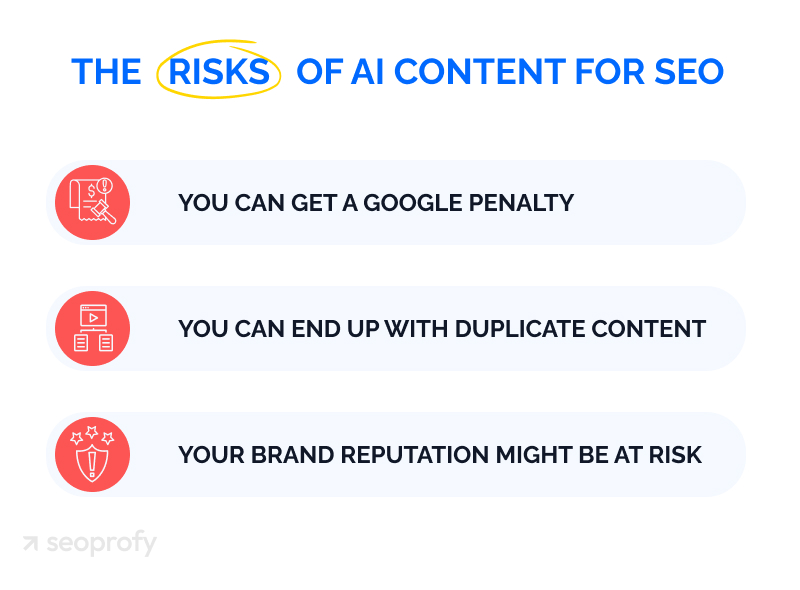
You Can Get a Google Penalty
This is the most serious risk, and yes, it’s already happened. Google’s ranking systems have specific content quality criteria that unedited AI-generated content simply can’t meet. So, if you’re publishing hundreds of low-quality articles just to scale content quickly, you’re walking straight into dangerous territory.
Google has started issuing manual actions after its March 2024 Core Update. Manual actions happen when the website fails to meet the quality guidelines. It’s when Google moderators look at your content and choose to remove it from Google search.
And when that happens, your site can get completely deindexed. Remember the Originality.AI research we mentioned earlier? According to their data, in March 2024, over 1,400 websites using ad networks like Mediavine, Raptive, and Ezoic were hit with manual actions. Many of them lost all their traffic. Spencer Haws shared it in his tweet:
“At least 1,446 Google Manual Actions have been applied since March 5th… These sites are completely deindexed. Cumulative traffic loss of 20 million visitors per month.”
Spencer Haws
One of the examples of such websites is EquityAtlas. Their site had more than 4 million monthly organic visits. And then in March 2024, they had a sudden drop in organic traffic.
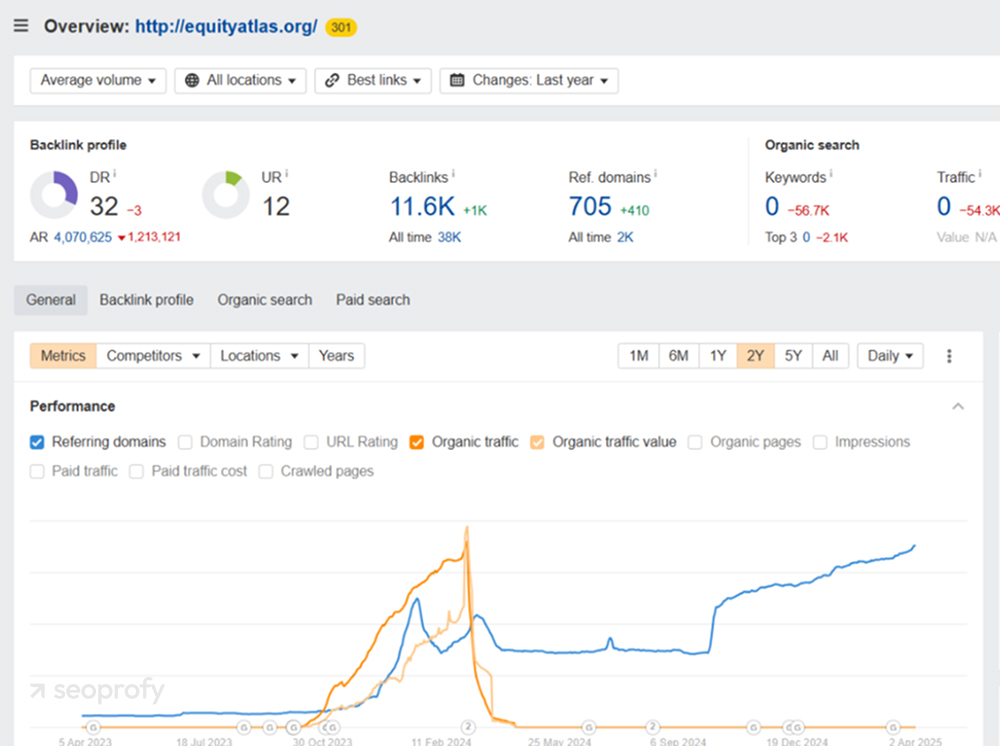
Another example is Casual.App. They used AI content, and after the November 2023 Core Update that addressed E-E-A-T, their traffic saw a major drop.
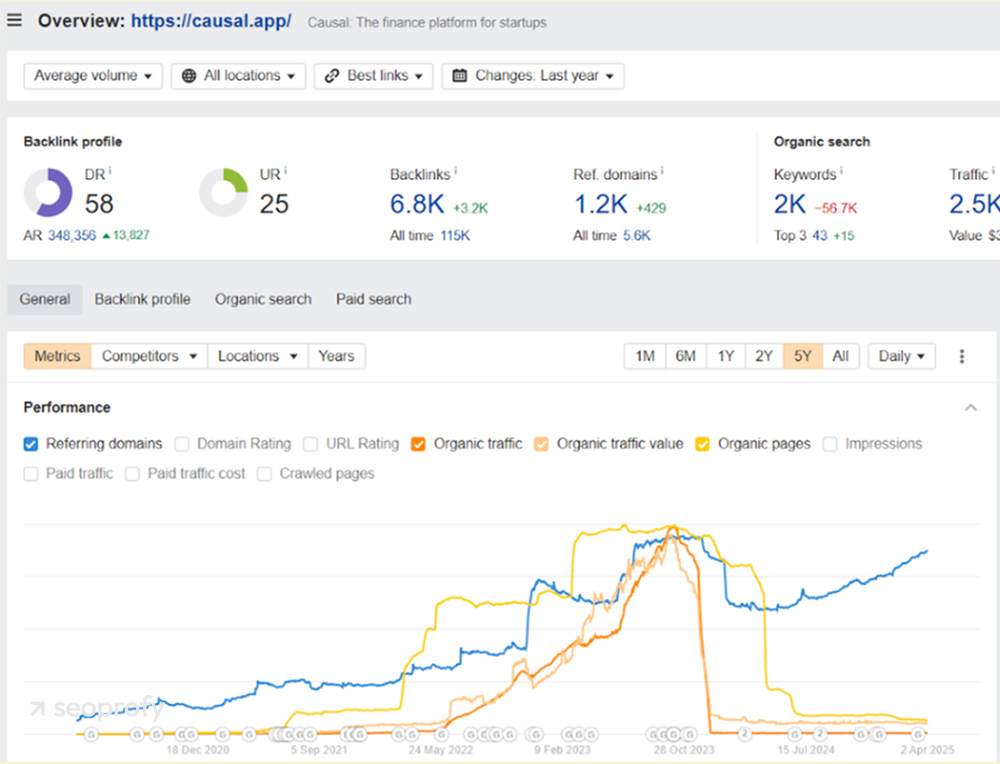
We’ve seen similar cases in our work and helped businesses across different niches recover after core updates. You can find examples in our SEO case studies.
You Can End Up with Duplicate Content
Manual actions aren’t the only risk. Using AI-generated content in an SEO strategy can also lead to issues with duplicate content. Since many AI tools produce content from the same set of information, multiple websites can end up with nearly identical content if they use similar prompts or templates.
Even if it’s not exact-match plagiarism, it becomes harder for your content to stand out. Google may not flag them with a penalty, but it will likely skip over your pages in favor of something more original. That’s why, to achieve success with blogging for SEO, you need to create unique posts.
Your Brand Reputation Might Be at Risk
Research shows that 70% of internet users choose to read blog posts to learn more about a company. That means the way people see your business often depends on the content they find on your site.
If that content is full of mediocre copy or rewritten tips from other blogs, it doesn’t build trust. It makes you look like every other company trying to rank, not like one that understands its audience’s needs. As Ross Simmonds, CEO of Foundation Marketing, puts it:
“In the era of AI-driven content, the actual content has become a commodity. We’re drowning in blog posts, ebooks, white papers, webinars, and courses. The amount of mediocre content available today is SIGNIFICANT… And that’s wherein lies your opportunity. Create content that isn’t mediocre. Create content that shapes culture.”
Ross Simmonds
It’s no longer enough to write generic content and expect results. Here’s what kind of content you get with SeoProfy:
- Optimized for Google, written for humans
- Fact-checked and original
- Aligned with the latest quality guidelines

How to Avoid Risks When Using AI Content for SEO
Is it impossible to get both AI and SEO benefits at once? There are ways to implement these tools in your content marketing, but you have to be careful. In this section, we’ll share helpful tips on how to use SEO and AI-generated content strategically.
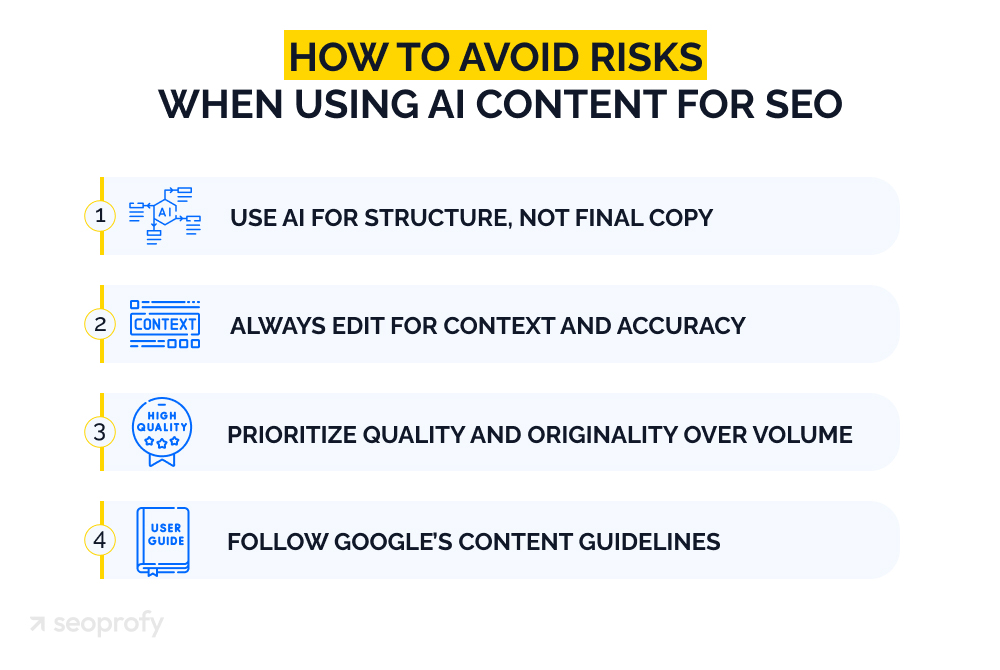
Use AI for Structure, Not Final Copy
AI tools for SEO can be helpful at the beginning of the writing process. When you have your keywords and internal linking ideas, paste them into a tool to create outlines, structure your ideas, or speed up research. A more advanced way to do it is to also add your competitors and see content gaps that you can fill.
But once you move past that point, the work needs a human hand. These are your subject-matter experts and editors who can review the text for accuracy and readability. As they go over the draft, they can add their personal point of view and make sure it shows E-E-A-T signals.
Always Edit for Context and Accuracy
Hallucinations and inaccurate statements in AI content are a problem if you’re publishing anything with real-world implications: stats, recommendations, product comparisons, or even basic definitions. HubSpot’s research found that 86% of marketers edit the content generated by AI tools. That tells you all you need to know.
So, any time you use AI-generated content in SEO, check the claims and facts. Do your own research and add the most recent information to make sure you create helpful content.
Prioritize Quality and Originality Over Volume
Although there are conflicting reports on whether Google will start penalizing AI-generated content, it does take issue with low-quality content created in large volumes or written to game search engine algorithms. To stay on the right side of Google’s updates, focus on the quality and uniqueness of your pieces instead of the number of articles or their word count.
In other words, do as Ryan Law suggests in his post:
“In the era of generative AI, there is no edge to be found by simply shuffling common knowledge from place to place. We need to find new dimensions of differentiation and lean into our unique strengths.”
Ryan Law
Follow Google’s Content Guidelines
Google’s algorithm updates come fast, and each one shifts the way content is evaluated. To create AI-generated content that performs well and doesn’t lead to penalties, you need to understand what Google expects from it.
One of the best places to start is with this list of questions designed to help you assess whether your content measures against the standards:
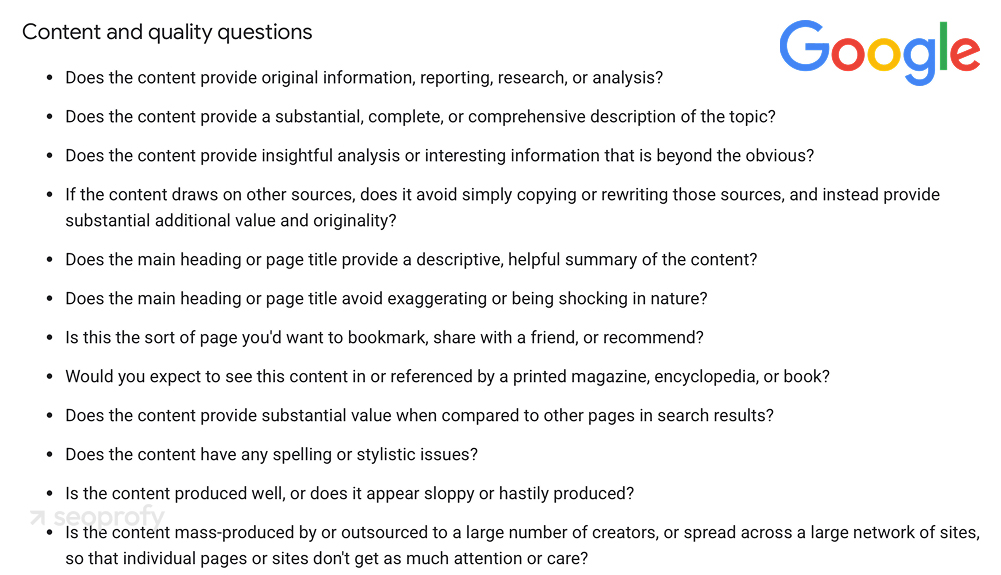
Look through them and assess your content ideas. This will help you make sure that your pages are expertly written and offer value to your readers.
Final Thoughts
So, is AI-generated content good for SEO? It can be. When comparing the SEO performance of AI content vs. traditional content, we see that generated pieces can still show great results. However, it takes work. You’ll still need to perform keyword research, ask for input from subject-matter experts, and do plenty of editing. A combination of AI and human effort is the most optimal solution.
Unsure what would work best for your business? Consider our SEO copywriting services. We write with rankings in mind, but always for people first. Our clients have already seen top-page rankings and more traffic with our high-quality content, and we’d be happy to help you achieve similar results!



